Letter from James Buchanan to Charles Breuil
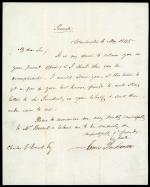
Secretary of State James Buchanan (Class of 1809) writes to Charles Breuil, who wishes to be relieved of his current government duties.


Secretary of State James Buchanan (Class of 1809) writes to Charles Breuil, who wishes to be relieved of his current government duties.
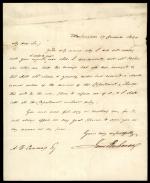
Senator James Buchanan (Class of 1809) writes to lawyer A. B. Cummings regarding his initial non-compliance with a request from the latter.

Senator James Buchanan (Class of 1809) writes to Colonel C. W. Gooch, thanking the latter for procuring four James River and Kanawha Bonds on his behalf.
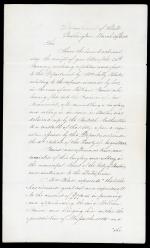
Secretary of State James Buchanan (Class of 1809) writes to Massachusetts Senator John Davis regarding the burglary of Mrs. Sally Blake's house in Boston.
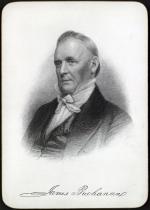
Engraving based on a daguerreotype of James Buchanan by New York's H. B. Hall & Sons.

Pennsylvania politician James Buchanan (Class of 1803) writes to Peter G. Washington about political appointments and state elections.
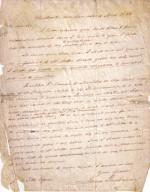
James Buchanan (Class of 1809) writes to Robert Tyler about his nomination as President and discusses one of the delegates at the Pennsylvania State Convention, a Franklin K. Curran of Marietta. Robert is the son of President John Tyler.

Rufus Choate, a former US Senator from Massachusetts, writes President James Buchanan (Class of 1809) to request the appointment of Edward Riddle as a naval agent in Boston, Massachusetts.

New York Supreme Court Judge Henry Hogeboom writes to President James Buchanan and recommends John C. Perry for an appointment as a judge in one of the western organized territories.
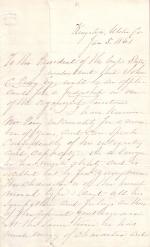
New York Supreme Court Justice William B. Wright writes to President James Buchanan and recommends John C. Perry for an appointment as a judge in one of the western organized territories.
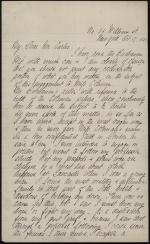
Samuel Barlow writes to George Ticknor Curtis about Curtis' James Buchanan manuscript that contains material on Buchanan's engagement to Miss Anna Coleman.

Representative David Wilmot, a Democrat from Pennsylvania, writes to Reah Frazer and asks for certain information that could be used to discredit Secretary of State James Buchanan politically.

Treasury Secretary Howell Cobb writes to David Tompkins and accepts his election to the James Buchanan Literary Association of New Haven, Connecticut.
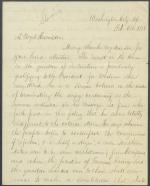
William Bigler writes to A. Boyd Hamilton and discusses President James Buchanan and several national political issues, including slavery, the Dred Scott decision, and the Lecompton Convention in Kansas.
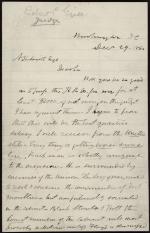
United States Supreme Court Justice Robert Cooper Grier (Class of 1812) writes to Aubrey H. Smith regarding the secession crisis.

Hiram Walbridge writes President James Buchanan to introduce Robert Gamble and recommend him for a political appointment.
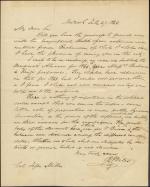
Barnabas Bates writes to Jesse Miller and asks for a "biographical sketch" of Senator James Buchanan.
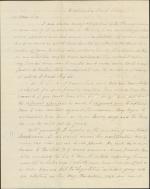
Representative Henry Augustus Philip Muhlenberg writes to John Meredith Read, an attorney in Philadelphia, about various political intrigues and comments on James Buchanan's election to the United States Senate.

Governor of Virginia Henry Alexander Wise comments on various national political issues and on the 1860 presidential election.
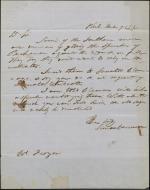
Simon Cameron writes to Reah Frazer, an attorney in Lancaster County, Pennsylvania, and requests copies of James Buchanan's speeches against the war, presumably the Mexican-American War.
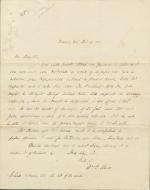
William Bradford Reed writes an unknown recipient and discusses President James Buchanan's perspective on the secession crisis.

Postmaster General James Campbell writes to Reah Frazer, an attorney in Lancaster County, Pennsylvania, about various political issues and James Buchanan as a possible candidate for a future Presidential election.
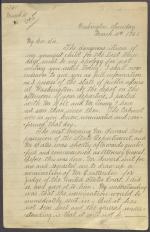
Former Attorney General Edwin McMasters Stanton writes former President James Buchanan to discuss public affairs in Washington and comment on events that occurred during the last few months of Buchanan's administration.

Edwin McMasters Stanton writes former President James Buchanan to discuss possible nominations to fill a vacancy on the Supreme Court and comment on resolutions in the Senate that might end the secession crisis.
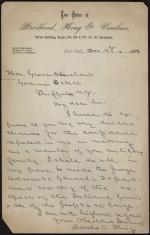
Horatio Collins King writes Governor Elect of New York Grover Cleveland and thanks him for the appointment as a Judge Advocate in the National Guard. King notes his "sincere thanks for... making me a member of your military family."